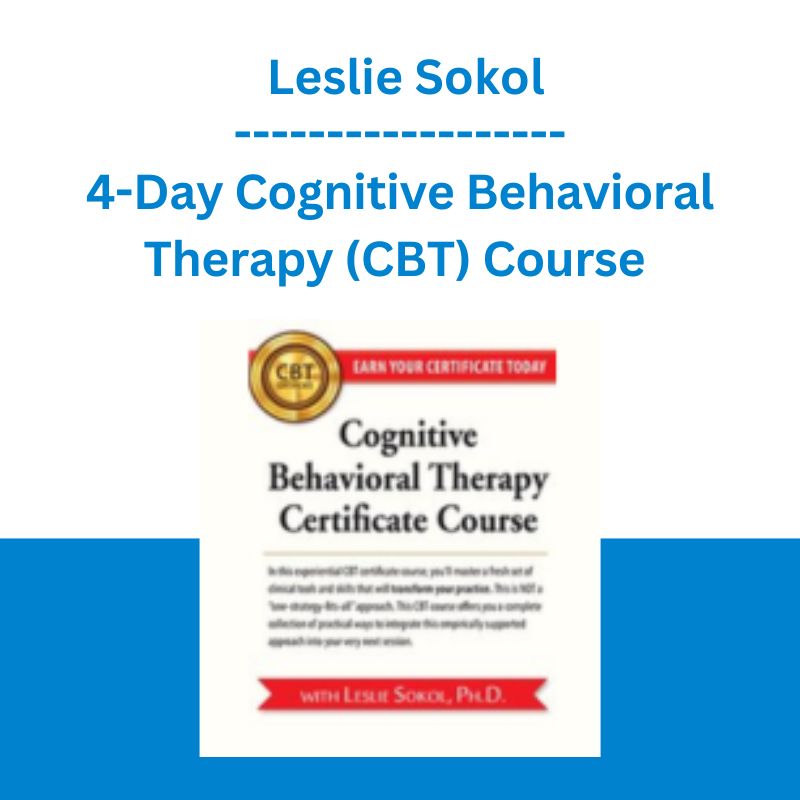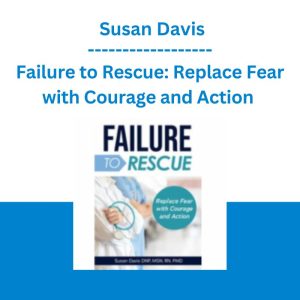*** Proof of Product ***
Exploring the Essential Features of “4-Day Cognitive Behavioral Therapy (CBT) Course – Leslie Sokol”
This recording is a breakthrough Cognitive Behavioral Therapy (CBT) Course to develop core competencies and transform your skills to achieve better therapeutic outcomes, even with your most challenging clients!
You will be able to utilize concrete strategies that will provide greater healing for your clients who suffer from:
- Mood disorders
- Substance abuse
- Anger
- Personality disorders
- Anxiety disorders
- Suicidality
- PTSD
- And many more challenging clients!
You’ll get effective clinical techniques from Leslie Sokol, Ph.D. an internationally recognized leader in the field of Cognitive Behavioral Therapy and formerly one of the principal instructors with the internationally acclaimed Beck Institute for Cognitive Behavioral Therapy in Philadelphia. She will teach you how to master the art of applying CBT to a variety of clinical populations. Watch her for this revolutionary experience as she reveals the latest advances in CBT to get the skills you need to succeed!
Speaker
Leslie Sokol, PhD
Leslie Sokol, PhD, is a licensed psychologist and internationally recognized leader in the field of cognitive behavioral therapy (CBT), with almost 40 years of experience in practice, teaching and research. She was a past Director of Education and one of the principal instructors at the internationally acclaimed Beck Institute for Cognitive Behavior Therapy. She is one of the leading CBT speakers in the world, providing teaching and training to professional and paraprofessional groups, both nationally and internationally, on a multitude of CBT topics.
Dr. Sokol is a distinguished founding fellow of the Academy of Cognitive and Behavioral Therapies, was a past president, and is currently Chairman of its Credentialing Committee. She is a fellow of the Association for Behavioral and Cognitive Therapies (ABCT) and President Elect of the International Association of Cognitive Psychotherapy (IACBT). Dr. Sokol also served as Chairman of Behavioral Science for the Mercy Suburban Hospital and Family Practice Training Program for over 20 years. Her private practice is in Lansdale, Pennsylvania.
Dr. Sokol has coauthored numerous books and book chapters. Her most recent books include: The Comprehensive Clinicians Guide to Cognitive Behavioral Therapy; Teaching and Supervising Cognitive Behavioral Therapy; Think Confident, Be Confident for Teens: A Cognitive Therapy Guide to Overcoming Self-Doubt and Creating Unshakable Self-Esteem; Think Confident, Be Confident: A Four-Step Program to Eliminate Doubt and Achieve Lifelong Self-Esteem; and The Think Confident, Be Confident Workbook for Teens: Activities to Help You Create Unshakable Self-Confidence and Reach Your Goals.
Speaker Disclosures:
Financial: Dr. Leslie Sokol maintains a private practice and has an employment relationship with Montgomery County. She receives royalties as a published author. Dr. Sokol receives a speaking honorarium, book royalties, and record royalties from PESI, Inc. She has no relevant financial relationships with ineligible organizations.
Non-financial: Dr. Leslie Sokol is a member of the Academy of Cognitive Behavioral Therapy and a fellow of the Association for the Advancement of Behavior and Cognitive Therapy. She serves as the president-elect of the International Association of Cognitive Psychotherapy. Dr. Sokol is on the advisory board of the Journal of Cognitive and Behavioral Psychotherapy and Research.
Outline
Master the Core Skills and Competencies of CBT
Foundations in CBT
- Evolution of Cognitive Behavioral Therapies
- Limitations of the Research and Potential Risks
- Outcome Studies
Offshoot Models
- Third Wave Approaches
- DBT
- Acceptance & Commitment Therapy
- Schema Therapy
Treatment Concepts
- Socialization to Treatment Model
- Establishment of Problem lists and Goals
The Therapeutic Relationship
- Establish Rapport
- Ruptures in the Therapeutic Alliance
Cognitive Conceptualization
- Case Formulation
- Collaborative Empiricism
- Sociotrophic and Autonomous Personality
- Identifying Underlying Beliefs
Key Components of CBT Practice
- Structure
- Feedback
- Guided Discovery
- Collaborative Empiricism
- Homework
Proficiency and Fidelity to the Model
- The Cognitive Therapy Rating Scale
CBT for Mood Disorders, Anger, Anxiety, PTSD, Substance Abuse and Group Settings
CBT for Mood Disorders
- Cognitive Model of Depression
- Behavioral Activation
- Sleep Hygiene
- Activity Monitoring & Scheduling Modify Negative Cognitions
- Bipolar Disorder
Behavioral Activation
- Assessment
- Basic Principles
- Scheduling
Cognitive Restructuring
- Levels of Cognition
- The Downward Arrow Technique
- Identify & Evaluate Automatic Thoughts
- Eliciting & Labeling Distortions
Application to Clinical Practice
- Case Studies/Role Plays
CBT for Anger
- Cognitive Model of Anger
- Role of Values & “Moral Resistance”
- Symptom Management
CBT for Anxiety
- Model Overview
- Appraisals and Restructuring Fear
- Exposure Strategies
Specific Anxiety Disorders
- Generalized Anxiety
- Phobias
- Panic Disorder
- Interoceptive Strategies
- OCD
- Intrusive Thoughts
- Metacognitive Strategies
- Behavioral Experiments
CBT for PTSD
- Prolonged Exposure
- Cognitive Reprocessing
- Trauma Narratives
CBT for Substance Abuse
- Impulse Control Models
- Monitor Cravings & Resist Urges
- Relapse Prevention
- Application to Clinical Practice
- Case Studies/Role Plays
Group CBT
- Basic Principles
- Video Demonstration
Difficult Cases, Cluster B & C Personality Disorders
Overview of CBT for Challenging Cases
- Why are they challenging
- Adaptations in CBT
- Modified Expectations for the Therapist
Treatment Model
- Early Maladaptive Schemas
- Breaking Destructive Behavioral Cycles
- Belief Modification Protocol
CBT for Cluster B Personality Disorders
- Antisocial
- Narcissistic
- Histrionic
- Borderline
CBT for Cluster C Personality Disorders
- Modifying Avoidant Schemas and Strategies
- Changing Dependent Beliefs and Behaviors
- OCPD: Interventions and Strategies
Target Audience
- Psychologists
- Counselors
- Social Workers
- Psychotherapists
- Case Managers
- Marriage & Family Therapists
- Nurses
- Addiction Counselors
- Mental Health Professionals
Objectives
- Apply evidence-based CBT techniques to multiple symptom sets to improve treatment outcomes.
- Choose methods for conducting CBT psychoeducation to elicit “buy in” from difficult clients.
- Point out, challenge and modify clients’ dysfunctional self-talk, thoughts and core beliefs to improve client level of functioning.
- Develop case conceptualization skills for treating DSM-5® diagnosis with CBT informed strategies.
- Implement rapport-building tools to improve the therapeutic alliance and client engagement.
- Evaluate behavioral activation strategies useful for improving treatment resistant depression.
- Develop strategies for treating depressive relapses to improve to improve client level of functioning.
- Implement cognitive behavioral methods to reduce intrusive, obsessive compulsive thoughts.
- Integrate strategies for impulse control to treat clients with substance use-disorders.
- Provide exposure and cognitive processing interventions to treat symptoms of PTSD and trauma.
- Utilize cognitive reprocessing for clients with PTSD in order to improve treatment outcomes.
- Implement CBT-informed symptom management strategies for personality disorders.
- Articulate the role of early maladaptive schemas in developing and maintaining chronic mental health conditions.
- Utilize schema-based strategies for breaking lifelong destructive behavioral cycles in clients.
- Determine eight motivations for parasuicidal behaviors and how to effectively intervene for each motivation.
- Determine how family dynamics are affected by an individual with Borderline Personality Disorder and identify strategies for improving family communication.
- Implement suicide assessment skills and compose accurate documentation in order to minimize risk and liability.
- Develop strategies to increase buy in with clients with substance abuse disorders.
- Determine the demanding imperative of anger and replace with more helpful preferences to improve treatment outcomes.
- Determine and differentiate the meanings given to unfulfilled demanding expectations as a strategy to reduce hurt and fear.
- Implement cognitive behavioral strategies in a group.
- Utilize techniques to enhance individual participation in group therapy.
- Develop a comprehensive understanding of clients through the lens of the cognitive model.
- Determine the specific cognitive content of fear associated with individual anxiety disorders.
Please see the full list of alternative group-buy courses available here: https://lunacourse.com/shop/










 Emanuele Bonanni - My Trading Way
Emanuele Bonanni - My Trading Way  Team NFT Money - Ultimate NFT Playbook
Team NFT Money - Ultimate NFT Playbook  Matan Feldman - The 13-Week Cash Flow Modeling - Wall Street Prep
Matan Feldman - The 13-Week Cash Flow Modeling - Wall Street Prep  Racing Workshop - Complete Online Package
Racing Workshop - Complete Online Package  Erik Banks - Alternative Risk Transfer
Erik Banks - Alternative Risk Transfer  Greg Loehr - Advanced Option Trading With Broken Wing Butterflies
Greg Loehr - Advanced Option Trading With Broken Wing Butterflies  George Fontanills & Tom Gentile - Optionetics 6 DVD Series Home Study Course (Digital Download)
George Fontanills & Tom Gentile - Optionetics 6 DVD Series Home Study Course (Digital Download)  Alphashark - The AlphaShark SV-Scalper
Alphashark - The AlphaShark SV-Scalper  The Daily Traders – Exclusive Trading Mentorship Group
The Daily Traders – Exclusive Trading Mentorship Group  Jesse Livermore Trading System - Joe Marwood
Jesse Livermore Trading System - Joe Marwood  Julie Stoian & Cathy Olson - Launch Gorgeous - Funnel Gorgeous Bundle
Julie Stoian & Cathy Olson - Launch Gorgeous - Funnel Gorgeous Bundle  Trade Like Mike - The TLM Playbook 2022
Trade Like Mike - The TLM Playbook 2022  Oklahoma Legal and Ethical Issues for Mental Health Clinicians - Susan Lewis - PESI
Oklahoma Legal and Ethical Issues for Mental Health Clinicians - Susan Lewis - PESI  Sovereign Man Confidential - Renunciation Video
Sovereign Man Confidential - Renunciation Video  Chris Capre - Advanced Price Action Ongoing Training & Webinars
Chris Capre - Advanced Price Action Ongoing Training & Webinars  Ed Ponsi - Forex Trading
Ed Ponsi - Forex Trading  Toshko Raychev - Profit System + ITF Assistant
Toshko Raychev - Profit System + ITF Assistant  Crypto Dan - The Crypto Investing Blueprint To Financial Freedom By 2025
Crypto Dan - The Crypto Investing Blueprint To Financial Freedom By 2025  Money Miracle - George Angell - Use Other Peoples Money To Make You Rich
Money Miracle - George Angell - Use Other Peoples Money To Make You Rich  George Fontanills & Tom Gentile - Optionetics Wealth Without Worry Course
George Fontanills & Tom Gentile - Optionetics Wealth Without Worry Course